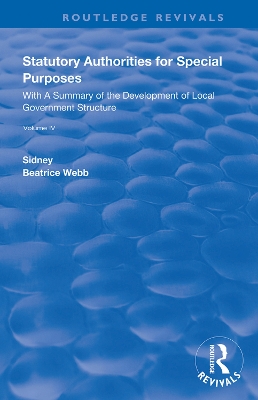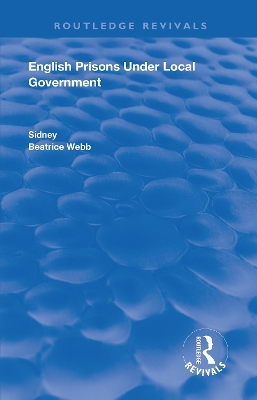Routledge Revivals
4 total works
Originally published in 1963, this volume is devoted to an analysis of the organisation of the Commissioners of Sewers, the Incorporated Guardians of the Poor, the Turnpike Trusts and the Improvement Commissioners, and depicts the important development of these bodies during the eighteenth century. By examining the constitutional features of these statutory authorities Mr. & Mrs. Webb support their main contention that here are to be found the beginnings of most of the Local Government services of the present day.
But to most readers the chief interest of this volume will lie in the last two chapters, which analyse the whole development of English Local Government from the Revolution to the Municipal Corporations Act. This description of how the 'Old Principles' between 1689 and 1835 were gradually superseded by the 'New Principles' affords a convenient summary of the first four volumes.
First published in 1922, in this volume Sydney and Beatrice Webb give a detailed account of the evolution of the English Prison System from the common gaol and the house of correction of the sixteenth century down to the statutory changes of the twentieth century, and survey the successive efforts at reform of John Howard and Elizabeth Fry, Jeremy Bentham and James Neild, Sir T. Fowell Buxton and J.J. Gurney. The origin and development of the cellular system, the treadwheel and the crank, the penal dietary and the "system of progressive stages" all come under review, together with the administrative changes made by Sir Edmund Du Cane and Sir Evelyn Ruggles, and the reforms during the first part of this century.
In his original preface, Bernard Shaw makes a penetrating analysis of the whole theory of punishment and the incarceration of our fellow-citizens, maintaining that "Imprisonment as it exists today ... is a worse crime than any of those committed by its victims; for no single criminal can be as powerful for evil, or as unrestrained in its exercise, as an organized nation".
Professor Radzinowicz in a masterly new introduction surveys the development of the prison system in this century and concludes by saying of 'English Prisons under Local Government' that "No one can claim to understand English penology today without having read and reflected upon this book, for it imparts not only knowledge but perspective."
First published in 1910, this volume is a dispassionate analysis of the changes in and the various aspects of official policy towards pauperism from the 'Revolution of 1834' to the Majority and Minority Reports of 1909. In their preface to this volume the Webbs wrote:
"What obscured the history was the manner in which masses of heterogeneous facts were heaped together. To read, one after another, these complicated Orders and lengthy Reports, each dealing with all kinds of paupers and various methods of relief, was but to accumulate confusion. They resembled a heap of geological conglomerates which could not be assayed until they had been broken up in such a way as to sort the different materials into separate homogeneous parcels".
This book succeeds in presenting a masterly survey of this sector of the British social services on the eve of the foundation of the Welfare State, and completes the corpus of the Webbs on the Poor Law.



